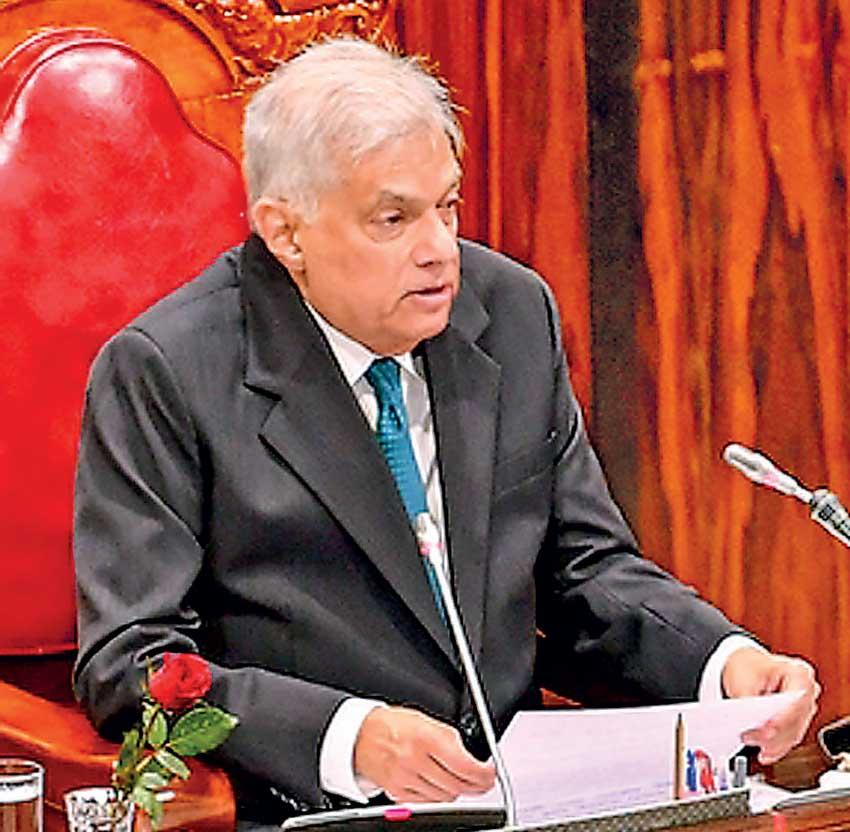Reply To:
Name - Reply Comment

Ranil Wickremesinghe
President Ranil Wickremesinghe made his second throne speech in Parliament yesterday to reinforce his blueprint to put the economic back on track and made clear that his government has no role in private businesses except for creating a conducive environment for the private sector to drive the economy.
As the country has entered an election campaign season ahead of the scheduled local government elections, everyone’s focus is fixed on what various political parties present as their model for the economic recovery.
“We need to accurately identify the role of the government in these reforms,” Wickremesinghe told the House.
“The strategy of the government should be to guide the private sector in business activities, while being in the background. The government should intervene only in areas such as monitoring functions, public facilities and maintenance of law and order. The private sector should be used as the driving force of the economy. Also, private entrepreneurship should be utilised to strengthen foreign economic relations.
Staying on his message from the day he was appointed as the Prime Minister in May last year, Wickremesinghe said there are no shortcuts or easy ways but to stay on this current reform path to come out of the current crisis.
He attempted to reassure the markets, which are on edge on many things, including the uncertainty over the prospect of domestic debt restructuring, delay in the International Monetary Fund (IMF) bailout package and potential shake-up in politics. “The Paris Club announced yesterday that they would extend unstinted support for the Agreement with the IMF and debt restructuring.
The international support demonstrates that we are on the right path. This is reconfirmed by the pressure on the public becoming less than before,” Wickremesinghe said, projecting confidence of early resolution on debt assurances and the IMF deal coming through.
The markets took his remarks in strides as the All Share Price Index of the Colombo Stock Exchange gained 11.59 points or 0.13 percent to end the day at 8,987.45, while S&P SL20, which consists of more liquid stocks, declined 2.63 points or 0.09 percent to settle at 2,782.56.
The bond markets remained steady while the yields at the bill auction held yesterday saw only the three-month bill yield coming down by three basis points to 29.88 percent. The Central Bank managed to sell little over half of the Rs.100 billion it offered.
During his speech, Wickremesinghe responded to some of the criticism levelled against his actions by various parties, including the Opposition and touted his economic track record in the last six months since becoming the president, while cautioning the public of what they wished for from others who simply want political power.
He said his policies have ended the queues for fuel and cooking gas, reduced rolling power cuts and shortages of other commodities and have resulted in inflation and interest rates easing.
If the country stays the course, he projected single-digit inflation by the year-end and much lower interest rates, with the economy also turning a corner to a growth path.
“Continue on this path and build the country or destroy this path and ruin the country with sloganeering politics? The decision is before us,” he said in a direct rebuke to the two main Opposition parties, the NPP and SJB, which have said they would not back the IMF policies and dial back on the tax hikes while offering populist policies instead.
“However, some groups are trying to disrupt this process. They uphold the reduction of taxes, raise wages, etc. if they come to power and attempting to organise various activities to sabotage the present process.”
On recent tax hikes he said he sees an irony in the manner in which some of the professionals, who proposed and endorsed tax hikes, including the PAYE, are now agitating against the same.
He recalled how the Sri Lanka Administrative Service Association presented short-term proposals in April, last year, to raise taxes, including the PAYE, even before the country began negotiations with the IMF.
“These are the suggestions we have implemented. However, it is the same people who requested such tax policies, who are criticising the present tax regime.”
“Introducing new tax policies is a politically unpopular decision. Remember, I’m not here to be popular. I want to rebuild this nation from the crisis situation it has fallen. Yes, I’m ready to make unpopular decisions for the sake of the nation. People will realise the importance of those decisions in two to three years,” he said.
He noted that Sri Lanka would lose Rs.63 billion, if a personal income tax threshold was doubled from the current Rs.100,000. Alluding to the rampant corruption, which is also identified as a major factor for the current economic crisis, Wickremesinghe said his government would bring an Anti-Corruption Bill, with further steps taking to include the ‘Stolen Assets Recovery Initiative (StAR)’ into this bill, with the support of the World Bank and United Nations. However, he said he would fix the economy first before charging and penalising those who are accused of being responsible for the crisis, which was in the making for decades.
“Sri Lanka’s economy today is severely damaged. Its malaise needs to be immediately diagnosed and treated accordingly. However, people are pointing to the mistakes made by those in-charge and are urging them to be punished first. However, I try to cure the malady first, after which we can take further measures. We should prioritise curing the ailment, which is what I am doing,” he said.